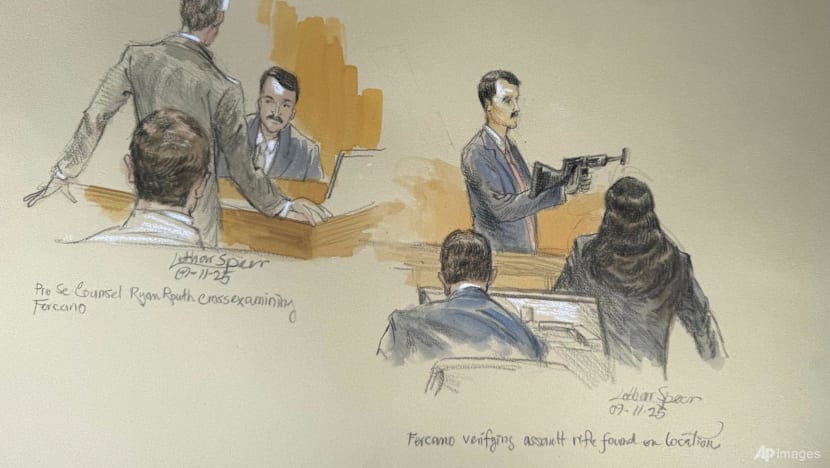Judge stops meandering trial argument from man accused of trying to kill Trump

Ryan Routh stands handcuffed between two Martin County Sheriff's office deputies after his arrest during a traffic stop near Palm City, Florida, US on Sep 15, 2024 (File photo: Reuters/Martin County Sheriff's Office)
FORT PIERCE: The criminal trial of the man accused of trying to assassinate United States President Donald Trump got off to a contentious start on Thursday (Sep 11) as a federal judge cut off a meandering opening statement from defendant Ryan Routh, who is representing himself in a proceeding set to showcase the increasing prominence of political violence in the US.
Florida-based US District Judge Aileen Cannon stopped Routh's presentation to a jury after only a few minutes as Routh delved into topics including the origin of the human species, the settlement of the American West, and international conflicts.
"This case means absolutely nothing," Routh said, prompting Cannon to send the jury out of the courtroom. Routh told the judge he wanted to speak about non-violence.
Cannon had earlier warned Routh that she had limited patience for an argument that would "make a mockery of the dignity of the courtroom".
Routh, 59, has pleaded not guilty to five federal charges, including attempted assassination of a major presidential candidate. He faces a maximum sentence of life in prison.
The trial began the day after right-wing activist and influential Trump ally Charlie Kirk was shot and killed during an event at Utah Valley University, marking the latest instance of political violence in the US.
Trump himself faced two assassination attempts during his 2024 presidential campaign that sent him back to the White House.
US prosecutors allege Routh hid with a rifle near the sixth hole green at Trump International Golf Club in West Palm Beach, intending to kill Trump as he golfed on the course on Sep 15, 2024.
"Last year, the defendant Ryan Routh wanted to make sure that the people of this country could not elect Donald Trump as president of the United States," prosecutor John Shipley said during his opening statement.
"So the defendant decided to take the choice away from American voters."
SPECIAL AGENT TESTIFIES TO SPOTTING SHOOTER
Shipley alleged Routh planned for weeks to kill Trump, travelling from his home in Hawaii to his native North Carolina and eventually to West Palm Beach in a family car with six cellphones and stolen license plates. He stayed at a truck stop for about a month, tracking Trump's movements and visiting the golf course about 17 times, Shipley told the jury.
Robert Fercano, a special agent with the US Secret Service, testified that he was patrolling on a golf cart ahead of Trump on the day of the incident and spotted a face and a rifle pointing at him through a fence. Fercano said he fired in the direction of the weapon, which prosecutors allege prompted Routh to flee.
During cross-examination, Fercano confronted Routh about the episode.
"Mentally, I have to live with the fact that you pointed a gun at my face," Fercano testified.

The incident came about two months after Trump was wounded in the ear following a shooting at a campaign rally in Pennsylvania last July. That gunman was shot dead at the scene.
Routh, who had lived an erratic life as a struggling roofing contractor, had advocated for democracy in Taiwan and Ukraine and was interviewed in 2023 about a quixotic plan to deploy Afghan refugees to help Ukraine repel Russia’s invasion.
In July, he told Cannon that he did not trust a “random stranger” to speak for him and would defend himself. His two former public defenders are now serving as standby lawyers to assist with logistical issues.
Reuters investigations have found that the United States is in the middle of the most sustained increase in political violence since the 1970s, a trend that began during Trump's first presidential run in 2016.
Other high-profile episodes include the shooting of Steve Scalise, a senior Republican member of the House of Representatives, at a congressional baseball game in 2017 and the Jan 6, 202, assault on the US Capitol by Trump supporters.
Democrats have also been recent targets of political violence. In April, an arsonist broke into Pennsylvania Governor Josh Shapiro's residence and set it on fire while the family was inside. In June, a gunman posing as a police officer in Minnesota murdered state lawmaker Melissa Hortman and her husband and shot state Senator John Hoffman and his wife.
The Routh trial begins as Trump puts his stamp on the US Justice Department, which is prosecuting the case, firing officials not loyal enough.
In a twist of fate, it will be held at the same courthouse and in front of the same judge where Trump faced criminal charges accusing him of illegally holding onto classified documents following his first term. Cannon, whom Trump nominated in 2020, dismissed that case before it reached a trial.
Cannon showed flashes of frustration with Routh during three days of jury selection and rejected his proposed questions to prospective jurors, which touched on topics including pro-Palestinian student activism and the war in Ukraine, which she called irrelevant.














